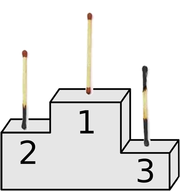|
Match has two definitions: the "thing you light on fire" and a "competition". Despite being homonyms, their etymologies can be followed back to completely different language families. The former definition, "a fire stick", comes from the Old English word macche, or "wick", which metynomically shifted to its current meaning. This is from Latin myxa ("wick"), from Greek muxa (you guessed it... "wick"), which finally changed definitions completely as we move backwards to around the sixth century BC, as mukes, "snot", was in use. The term came to be applied to the wax because of the similar composition, and comes from PIE mewk, meaning "slime". Now to the "competition" part of match. Back in the day, its only definition was "an equal" (that meaning remains today), and in a surprisingly tolerant display this extended to the connotation of "husband" or "wife". Keep in mind that this is in the Middle Ages. Wow. Anyway, phonetically this changed to maecca, "mate", from gamakon, or "fitting well together". This is from the Proto-Indo-European word mag, or "to fit". It's fascinating how match and match fail to match in their origins.
0 Comments
Your comment will be posted after it is approved.
Leave a Reply. |
AUTHORHello! I'm Adam Aleksic. I have a linguistics degree from Harvard University, where I co-founded the Harvard Undergraduate Linguistics Society and wrote my thesis on Serbo-Croatian language policy. In addition to etymology, I also really enjoy traveling, trivia, philosophy, board games, conlanging, and art history.
Archives
December 2023
TAGS |



